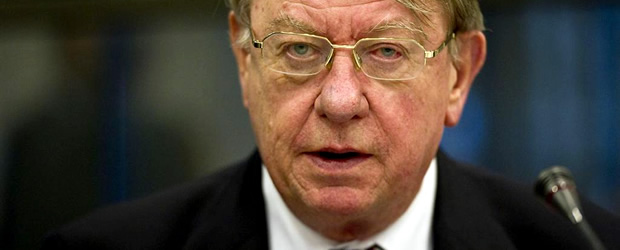Dutch defense minister Hans Hillen argues that transatlantic defense cooperation must be deepened and that this requires “a more practical approach to national sovereignty.”
In a speech to the Atlantic Council following a meeting earlier in the day with his American counterpart, Leon Panetta, Hillen argued that he is “quite optimistic” that the current budget austerity that is being forced on NATO members can lead to an improved Alliance. For that to happen, however, we must adapt it to new strategic realities, deepen defense cooperation, and gain public support and political will through effective leadership.
While many in Europe are concerned by the Obama administration’s recent announcement of a shift to the Pacific in its defense strategy, Hillen pronounced himself “pleased” by the “logical shift.” In turn, however, he believes it means Europe must pick up more of the burden “in its own periphery.”
Despite the complaints from this side of the Atlantic that the Europeans don’t spend enough, Hillen noted that Europe actually spends roughly $250 billion annually on defense. While that pales in comparison with the United States, it’s still “twice what China spends and five times Russia’s budget.”
The problem, Hillen contends, isn’t so much the level of spending but the inefficiency with which it’s spent. He notes that his own country has been ranked as the third most efficient country in the world in getting the most out of its defense spending, and yet they easily found substantial room for cuts by getting rid of wasteful staff and overhead costs.
Moreover, “defense cooperation is the exception” among the European Allies. Hillen notes that three quarters of procurement is spent nationally and argues that common equipment, maintenance, and training could bring huge efficiencies. While understanding that national sovereignty concerns are a major obstacle, he believes they can be overcome. He notes that the European Air Transport Command both pools resources and allows the withdrawal of assets for national utilization. More impressively, the Dutch and Belgian navies are practically one they’re so integrated.
To a rational defense analyst from Mars, this is all quite obvious. From the standpoint of national politics, however, it’s quite a leap of faith. Not only are countries naturally reluctant to give up control of something to central to their national identity as control of their defense assets—much less, as Atlantic Council executive vice president Damon Wilson suggested in Q&A, admit that they don’t actually need an air force of their own—but there’s also the matter of defense procurement as a jobs program.
The hope implied by Hillen is that national leaders will decide these risks are worth taking given the greater risks to their security that relatively steeper cuts mandated by not cooperating would bring. The counterargument, unfortunately, is that most in Northern and Western Europe see little actual threat to their security.
The solution to all this, Hillen argues, is leadership. Heads of state and ministers and chiefs of defense must convince their publics that more spending and more cooperation is necessary and that, as crucial as near-term economic interests are, they mean little if nations can’t secure their interests. But, unless Europe has simply been burdened all at once with the worst leaders in its history—and, having had the opportunity to see many of them up close in my current capacity, I see no evidence that’s the case—then this is wishful thinking. The case has been argued by many able heads of state and NATO secretaries general and the European publics have simply not be persuaded.
James Joyner is managing editor of the Atlantic Council.
Image: Hans-Hillen.jpg
